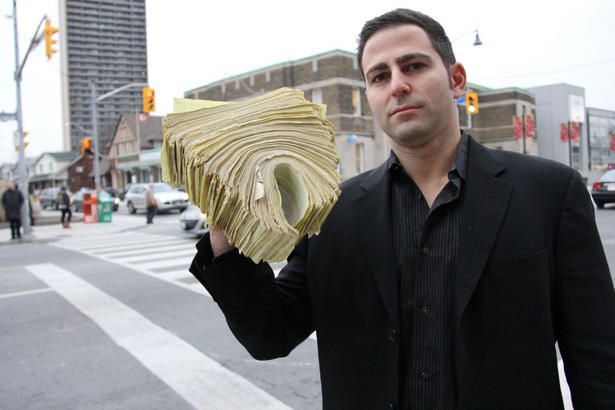
Published On Fri Jan 06 2012

Jay Kimel-Fleishman holds a stack of traffic tickets he has filed on behalf of GTA drivers through his business filemytickets.com.
Brendan Kennedy/TORONTO STARA middle-aged man dressed in a suit and tie surreptitiously approaches Jay Kimel-Fleishman with a tightly folded $20 bill poking out from his clenched right fist.
Kimel-Fleishman nods and the two men duck away from the crowd to make the deal in private. Kimel-Fleishman takes the man’s money and his yellow traffic tickets. He gives him his freedom.
The 33-year-old founder of FileMyTickets.com will now wait an hour in the drab Edwards St. offices of Toronto’s provincial traffic court to set the man’s court date, while the man goes on with the rest of his day.
“I’m saving people time,” says Kimel-Fleishman, a restless salesman who left his family’s business a year ago to start his online startup. “Everybody wants more time.”
Kimel-Fleishman and his company are the products of Toronto’s overloaded traffic court system, which discourages drivers from fighting tickets and then rewards them if they choose to endure the tedious process.
It’s a confusing logic: to prevent taking up court time and resources with frivolous cases, the city and province require you to set a court date in person if you want to fight the ticket, while allowing you to easily pay fines online. But, if you dutifully jump through all the hoops — even just to plead guilty at the end — you are usually rewarded with a reduced penalty.
“That’s the ridiculous nature of the system,” says Chris Conway, a former Toronto traffic cop turned paralegal and founder of Ott Legal Services.
It works this way because Toronto’s traffic courts are so overwhelmed by the number of tickets handed out, Conway says, that prosecutors are forced to plea-bargain to avoid trials.
Kimel-Fleishman exploits a flaw in the system by removing the main deterrent governments use to keep you from fighting tickets: wasting your time.
“They’re making it hard; I’m making it easy,” he says, waving the brick-sized stack of tickets he uses as an advertising prop.
Other jurisdictions don’t work this way.
“It’s definitely different outside of Toronto,” says Randy Houlahan, a paralegal and owner of Road Warriors, which specializes in traffic-ticket defence.
Plea bargains are offered everywhere, Houlahan says, but prosecutors outside of Toronto — who deal in far less volume — are in a better position to take tougher stances because the threat of trial is real.
For instance, if a driver was ticketed for going 32 km/h over the speed limit in Toronto, the four-demerit offence would probably be plea-bargained down to 15 km over and zero demerits, Houlahan said. In Whitby, the same offence is likely to be reduced no lower than 25 km over and three demerits.
“It’s defeating the whole demerit point system,” says Conway.
As to parking tickets, the city found a 450 per cent increase in trial requests in recent years, from 2.5 per cent in 2004 to 11 per cent in 2010. Sixty per cent of the people who requested trial in 2010 didn’t even show up, wasting court time and resources.
In response, last September the City of Toronto implemented a fixed-fine system for parking tickets to remove the incentive to fight tickets simply to get a reduced fine. Now a judge cannot reduce a fine after a guilty plea.
“Ultimately the court system is there for people who have a valid dispute,” says Casey Brendon, the city’s director of revenue. “You shouldn’t be using it to obtain a lesser amount for a conviction.”
But even with this week’s proposal to jack up the fines for certain parking tickets, they are relatively little hassle compared with provincial traffic tickets, which come with stiffer fines, demerit points and potentially higher insurance premiums.
Not to mention the wait times — often less than 15 minutes to set a date for a parking ticket, compared with an hour or more for traffic tickets.
The province does not keep statistics to gauge how traffic offences are resolved, but the tickets can always be negotiated at a prosecutor’s discretion.
Despite Kimel-Fleishman’s cloak-and-dagger deal-making with the man with the $20 bill, the service he provides is legal.
For $12 a traffic ticket and $7 a parking ticket, he acts as your agent by waiting in line and setting your court date for you. He has no legal training and will not attend your trial or give advice. He’s just a guy willing to wait in line.
And he says business is booming. Since launching his website in January 2011, he says he has filed more than 5,000 tickets and now employs a handful of part-time runners so he can be setting trial dates at multiple GTA courthouses on a daily basis.
On Thursday, he filed about a dozen tickets at the downtown Edwards St. office, including three people he persuaded to leave the line on the spot for cash. He actively solicited anyone at the courthouse who would listen.
“You can file those online — Filemytickets.com,” he said quietly to the people waiting for their queue ticket.
“Do you work here?” one man asks.
A day earlier, at a Tim Hortons on Yonge St., near Eglinton Ave., Kimel-Fleishman picked a seat in the coffee shop that allowed him to keep an eye on his black Infiniti illegally parked on nearby Broadway Ave.
He explained that he came up with the idea for FileMyTickets.com because he was “notorious” for accumulating tickets and despised paying for them. “I pay taxes, it should be covered.”
Minutes later, he had a clear view as a traffic cop tucked another yellow ticket under his windshield wiper.